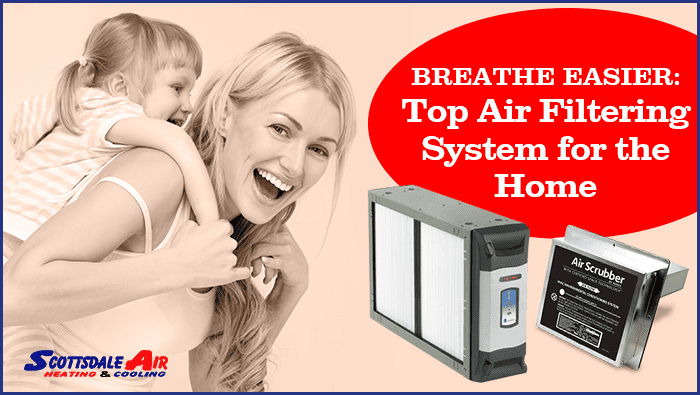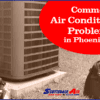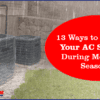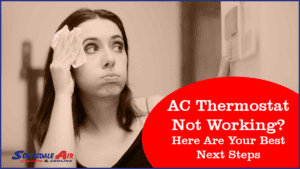More than 50 million Americans suffer from allergies, and about half are affected by indoor triggers. The most common are pollen, mold spores, dust mites, cockroaches, and pet dander.
Additionally, you may be concerned about your exposure to bacteria and viruses in your home. We spend about 90 percent of our time indoors, yet the air we breathe in our own homes can be more polluted than city smog.
Whether you’re hoping to mitigate allergies or reduce your exposure to viruses, it’s important to choose the right air filtering systems for home use. We’ll take a look at what air filtering systems do and how to pick the best one for your home.
What Is an HVAC?
HVAC stands for heating, ventilation, and air conditioning. It’s the system that keeps your home cool in the summer and warm in the winter. It’s also responsible for keeping the air inside your home clean and clear of irritants.
Dust that builds up on your furniture is more than an eyesore. It’s actually a mixture of mites, pollen, pet dander, mold and smoke that can make allergies worse. That’s why the “V” in HVAC is such an important part of the system.
Symptoms of Poor Air Quality
You can usually tell your system isn’t working well if it isn’t cooling effectively, or if it smells. For example, if your house starts to smell like dirty socks, that could indicate sitting water in the unit caused by a clog. A burning smell could indicate an electrical problem.
Poor air quality can also cause health problems for you or someone in your family. Those symptoms can range from mild to life-threatening. Be on the lookout for respiratory issues like sneezing and coughing, along with a sore throat.
HVAC Maintenance
You can reduce or eliminate most air quality issues by maintaining your home’s HVAC system regularly. The single most important thing you can do is change the filter.
Experts recommend you change it every three months. You may want to change it more often if someone in your home suffers from allergies or other respiratory conditions. Replacing your HVAC unit’s dirty or clogged filter can lower your air conditioner’s energy consumption by 5 to 15 percent. That saves money.
Filters work by sucking air in through materials that trap dust and other irritants and prevent them from being recirculated through your home. Some filter systems like the Air Scrubber Plus by Aerus go a step further and kill mold spores and viruses with a special UV light and filtration system.
It’s also important to keep the area around the outside unit clear. We recommend keeping a two-foot area around the unit clear of hedges and other landscaping to prevent dirt and other yard debris from clogging the unit.
Schedule a regular HVAC maintenance check-up with your HVAC provider. Most companies offer yearly inspections as part of your service agreement. This will not only ensure your system is delivering the air quality you need, but it will also keep your system running efficiently.
Which System Is Right for You?
The average high-temperature of Phoenix in the summer is 106.2°F. Choosing the right kind of HVAC system is critically important to your family’s health and safety.
We recommend a whole-house system for our clients in this area. Portable systems and window units simply can’t keep up with the heat here. We can offer a variety of financing options to help with your purchase.
The good news is products are more effective and efficient now than ever before. In fact, air conditioners use 30 to 50 percent less energy to produce the same amount of cooling as air conditioners made in the mid-1970s. It’s worth considering a new model if yours is more than ten years old.
Mitsubishi Electric HVAC systems offer variable refrigerant flow (VRF) and ductless systems. The company also offers Zoned Comfort Solutions®. The system allows you to control the temperature in individual spaces or multi-zone areas of your home with wall-mounted thermostats, smartphones, and tablets.
You’ll want to look at the Energy Efficiency Rating (EER) which will tell you how well the system will work. Replacing an older unit with an EER rating of five with one with an EER of 10 can cut your energy costs in half. You’ll also want to look for Energy Star-rated systems for the best energy efficiency.
It’s also important to choose the right size of air conditioner for your home. It sounds counter-intuitive, but a larger unit isn’t necessarily a better one.
If the unit is too large for your home, it won’t run efficiently, and it won’t remove humidity well. If it’s too small, it won’t be able to maintain a cool temperature on our scorching, summer days.
In many cases, you’re better off installing two units, rather than one large one. This is especially true for two-story homes. A larger unit won’t keep the upstairs cooler better than a second one that only controls the second story.
A professional can help you determine the right size for your home. You can also run the numbers yourself with an online calculator. Keep in mind, the size of the unit doesn’t mean the physical dimensions, but rather, its capacity to generate cool air.
Choosing the Right Air Filtering Systems for Home Use
As we discussed earlier, your air conditioner does a lot more than cool your home. It also keeps the air clean and your house well-ventilated.
For example, Trane Fresh Effects is an energy-efficient home ventilator that acts as an air exchanger to remove lingering bad odors and improve the quality of the air inside your home.
It also reduces humidity and preconditions incoming air which helps your system runs efficiently. Trane units are especially effective at handling the extreme heat and high winds in Phoenix.
There are some terms you should know before you shop for the right air filtering system. They are:
- MERV stands for Minimum Efficiency Reporting Value. The higher the number, the better it filters. Consumer Reports found the top performers have a MERV higher than 10.
- MPR stands for Microparticle Performance Rating. This number reflects the filter’s ability to capture airborne particles smaller than one micron. CR says the best filters have a rating between 1,500 and 1,900.
- HEPA stands for High-Efficiency Particulate Air. It uses an electrical charge to help trap particles like dust.
Some manufacturers and some stores have their own grading systems. The bottom line here is the higher the score, the better the system.
The Trane® CleanEffects™ Air Cleaner removes up to 99.98 percent of particles and allergens. It removes particles as small as .1 microns. That’s 1/1,000th the diameter of a human hair.
That’s significant, as more and more of our clients are concerned about issues other than the removal of dust particles. They’re looking for an air filtering system that can also trap viruses.
The virus that causes COVID-19 is approximately 0.125 microns wide. That falls well within the particle-size range that HEPA filters capture, 0.01 micron (10 nanometers), and above.
That’s another reason to consider a whole-house system, rather than a window unit or portable air filter. The filters in those products simply don’t catch tiny particulates. They’re designed more for catching the larger debris like pet hair and dirt.
The humidity in your home is also a factor in controlling the spread of viruses. Scientists recommend that you keep humidity levels between 40 and 60 percent because microorganisms are least viable in that range.
Choosing the Right Filter
Filters come in a variety of sizes, and some simply do a better job than others. Most are standard, one-inch filters that are installed in wall-mounted air-return vents or right at the air handler.
This is where the MERV rating is important. Again, MERV stands for Minimum Efficiency Reporting Value. The lower-rated filters (1-4) won’t trap particulates like dust, but they will catch pet hair and carpet fibers.
The higher-rated filters (11-13) will remove about half of fine particulates. Filters rated about 14 are typically used in hospitals, not homes.
The 3M Filtrete 2500 Smart Premium Allergen Ultra Fine Particle S-EAX22DC-6 filters out fine particulates. It also includes a sensor that pairs with your mobile device via Bluetooth® to alert you when the filters need changing.
Wrapping It Up
As you consider the air filtering systems for home usage, it’s important to keep in mind three key factors.
- The type of system
- The filters
- The maintenance of the entire HVAC system
Regular check-ups can keep your system running smoothly and efficiently. Click here to schedule an appointment today.
If you’re looking to improve the indoor air quality in your home or office, give Scottsdale Air Heating & Cooling a call at 480-359-7141 today or request an appointment online! We can educate you about the options and what products would fit your needs!








